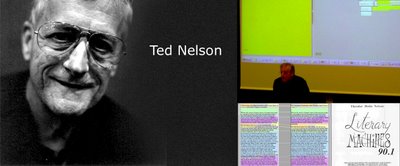CCS - Doug Engelbart and Ted Nelson


Doug Engelbart and Ted Nelson
Engelbart was a man driven by an intense personal philosophy that computing technology could provide people with the ability to increase their capability to deal with any given “complex problem situation, to gain comprehension to suit his particular needs, and to derive solutions to problems”. No-one could argue that the seminal work he conducted during his career hasn’t achieved this. Doug Engelbart led a small team of technicians and researchers from the Stamford University broke new ground and introduced revolutionary new technologies as part of the ‘Augment Project’ and many members of his team from the sixties are still powerful and influential figures in the computer world today. He envisioned or directly developed “the computer mouse, graphical user interface, display editing and integrated text and graphics, hyper-documents, and two-way video-conferencing with shared workspaces”, aspects of our modern day computer use we can hardly imagine being without. He is now involved in a foundation promoting the social and technological aspects of ‘Collective Intelligence’ whereby people can combine their intelligences to a greater goal and take the power of society into their own hands ( http://www.bootstrap.org/ ). He has held firm to his beliefs throughout his career; that the world is becoming an ever more complex and dangerous place to be and that both organisations and societies need to “boost their IQs” to meet all the challenges life will throw at them. He is a leading light in this new Utopianism, with plans to set up ‘Global Improvement Networks and the ongoing work on a new “open hyperdocument system”.
Ted Nelson always saw himself as an intellectual who could make a difference to the world believing at first he wanted to be a film-maker until he was exposed to the newly emerging field of computing while at College; “this was it - it was obvious, the human race would spend the rest of its career at computer screens”. His experiences with his own Attention Deficit Disorder where he found it very hard to recall events and important information in a logical order fired him with a life long desire to create a system “that would record all the connections and all the structures and all the thoughts that paper could not”. This was to be his Xanadu Project. A computing system whereby all the applications were linked and anyone could do whatever they wanted to a document; Nelson always hated the prescriptive and ‘One God’ approach to writing software. Along the way other, some might say cannier, inventors took aspects of his work and made them commercially successful, most famously Tim Berners-Lee and his appropriation of the HTML concept which has now become standard. Nelson still stands out today as a fiercely independent and original voice in the world of computing and still filled with an unshakeable belief in a new and more democratic way of computing.

0 Comments:
Post a Comment
<< Home